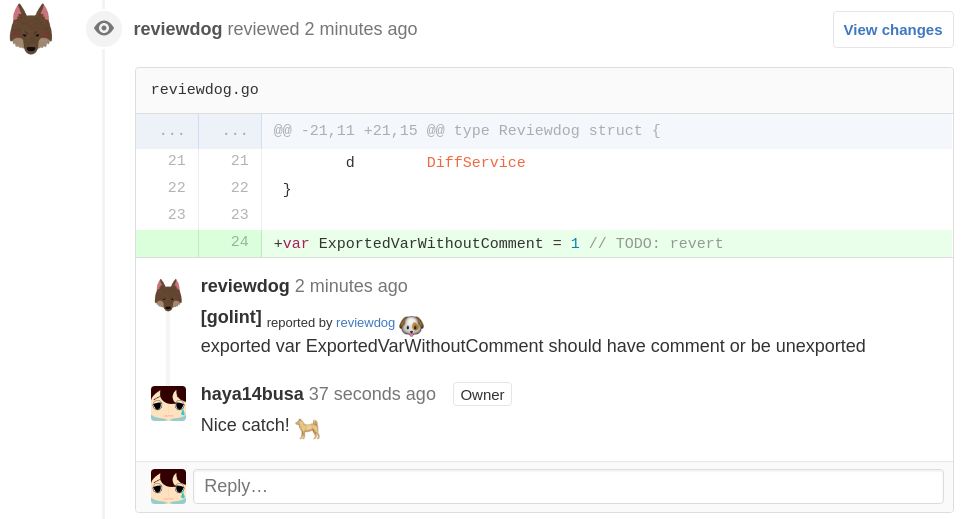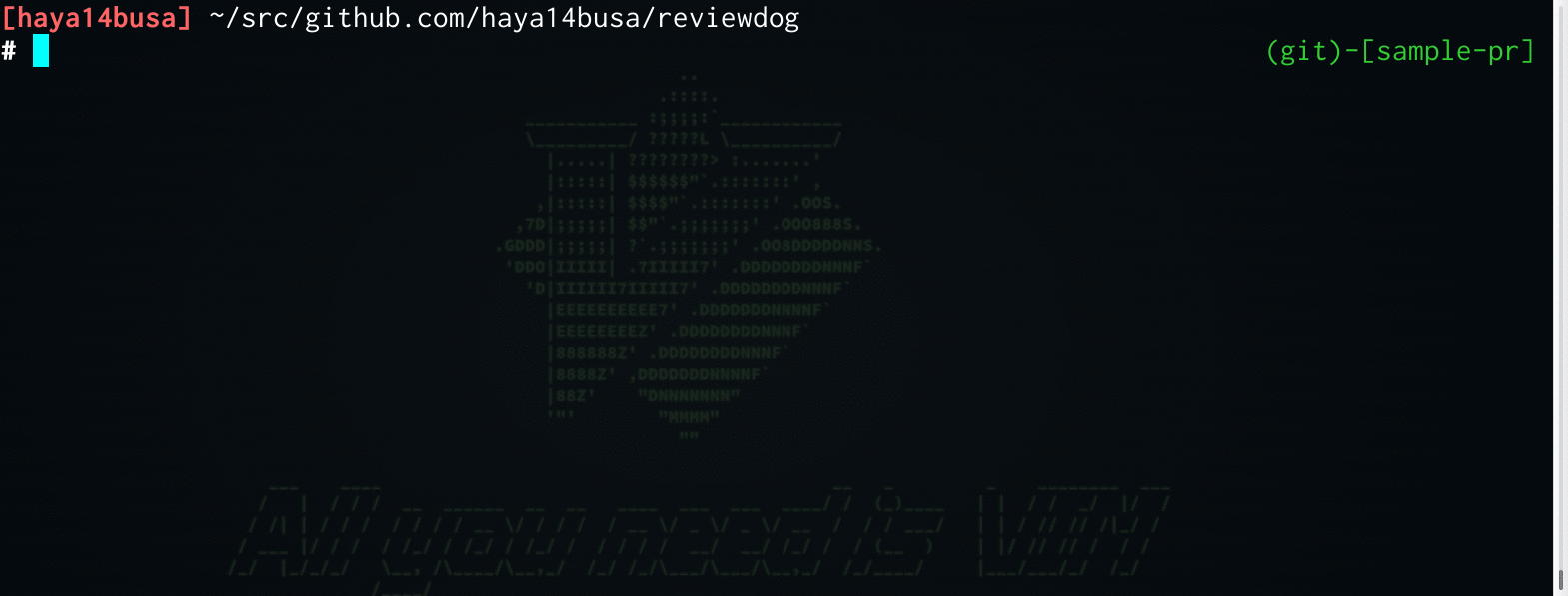 Documentation
¶
Documentation
¶
Index ¶
Examples ¶
Constants ¶
This section is empty.
Variables ¶
This section is empty.
Functions ¶
This section is empty.
Types ¶
type AddedLine ¶
type AddedLine struct {
Path string // path to new file
Lnum int // the line number in the new file
LnumDiff int // the line number of the diff (Same as Lnumdiff of diff.Line)
Content string // line content
}
AddedLine represents added line in diff.
type CheckResult ¶
type CheckResult struct {
Path string // relative file path
Lnum int // line number
Col int // column number (1 <tab> == 1 character column)
Message string // error message
Lines []string // Original error lines (often one line)
}
CheckResult represents a checked result of static analysis tools. :h error-file-format
type CheckStyleError ¶
type CheckStyleError struct {
Column int `xml:"column,attr,omitempty"`
Line int `xml:"line,attr"`
Message string `xml:"message,attr"`
Severity string `xml:"severity,attr,omitempty"`
Source string `xml:"source,attr,omitempty"`
}
CheckStyleError represents <error line="1" column="10" severity="error" message="msg" source="src" />
type CheckStyleFile ¶
type CheckStyleFile struct {
Name string `xml:"name,attr"`
Errors []*CheckStyleError `xml:"error"`
}
CheckStyleFile represents <file name="fname"><error ... />...</file>
type CheckStyleParser ¶
type CheckStyleParser struct{}
CheckStyleParser is checkstyle parser.
func (*CheckStyleParser) Parse ¶
func (p *CheckStyleParser) Parse(r io.Reader) ([]*CheckResult, error)
type CheckStyleResult ¶
type CheckStyleResult struct {
XMLName xml.Name `xml:"checkstyle"`
Version string `xml:"version,attr"`
Files []*CheckStyleFile `xml:"file,omitempty"`
}
CheckStyleResult represents checkstyle XML result. <?xml version="1.0" encoding="utf-8"?><checkstyle version="4.3"><file ...></file>...</checkstyle>
References:
type Comment ¶
type Comment struct {
*CheckResult
Body string
LnumDiff int
ToolName string
}
Comment represents a reported result as a comment.
type CommentService ¶
CommentService is an interface which posts Comment.
type CommentWriter ¶
type CommentWriter struct {
// contains filtered or unexported fields
}
func NewCommentWriter ¶
func NewCommentWriter(w io.Writer) *CommentWriter
func (*CommentWriter) Post ¶
func (s *CommentWriter) Post(c *Comment) error
type DiffService ¶
DiffService is an interface which get diff.
func NewDiffCmd ¶
func NewDiffCmd(cmd *exec.Cmd, strip int) DiffService
func NewDiffString ¶
func NewDiffString(diff string, strip int) DiffService
type DiffString ¶
type DiffString struct {
// contains filtered or unexported fields
}
func (*DiffString) Diff ¶
func (d *DiffString) Diff() ([]byte, error)
func (*DiffString) Strip ¶
func (d *DiffString) Strip() int
type ErrorformatParser ¶
type ErrorformatParser struct {
// contains filtered or unexported fields
}
ErrorformatParser is errorformat parser.
func (*ErrorformatParser) Parse ¶
func (p *ErrorformatParser) Parse(r io.Reader) ([]*CheckResult, error)
type GitHubPullRequest ¶
type GitHubPullRequest struct {
// contains filtered or unexported fields
}
GitHubPullRequest is a comment and diff service for GitHub PullRequest.
API:
https://developer.github.com/v3/pulls/comments/#create-a-comment POST /repos/:owner/:repo/pulls/:number/comments
func NewGitHubPullReqest ¶
func NewGitHubPullReqest(cli *github.Client, owner, repo string, pr int, sha string) *GitHubPullRequest
NewGitHubPullReqest returns a new GitHubPullRequest service.
func (*GitHubPullRequest) Diff ¶
func (g *GitHubPullRequest) Diff() ([]byte, error)
Diff returns a diff of PullRequest. It runs `git diff` locally instead of diff_url of GitHub Pull Request because diff of diff_url is not suited for comment API in a sense that diff of diff_url is equivalent to `git diff --no-renames`, we want diff which is equivalent to `git diff --find-renames`.
func (*GitHubPullRequest) Flash ¶
func (g *GitHubPullRequest) Flash() error
Flash posts comments which has not been posted yet.
func (*GitHubPullRequest) ListPostComments ¶
func (g *GitHubPullRequest) ListPostComments() []*Comment
ListPostComments lists comments to post.
func (*GitHubPullRequest) Post ¶
func (g *GitHubPullRequest) Post(c *Comment) error
Post accepts a comment and holds it. Flash method actually posts comments to GitHub in parallel.
func (*GitHubPullRequest) Strip ¶
func (g *GitHubPullRequest) Strip() int
Strip returns 1 as a strip of git diff.
type Parser ¶
type Parser interface {
Parse(r io.Reader) ([]*CheckResult, error)
}
Parser is an interface which parses compilers, linters, or any tools results.
func NewCheckStyleParser ¶
func NewCheckStyleParser() Parser
NewCheckStyleParser returns a new CheckStyleParser.
func NewErrorformatParser ¶
func NewErrorformatParser(efm *errorformat.Errorformat) Parser
NewErrorformatParser returns a new ErrorformatParser.
type Reviewdog ¶
type Reviewdog struct {
// contains filtered or unexported fields
}
Reviewdog represents review dog application which parses result of compiler or linter, get diff and filter the results by diff, and report filterd results.
Example ¶
difftext := `diff --git a/golint.old.go b/golint.new.go
index 34cacb9..a727dd3 100644
--- a/golint.old.go
+++ b/golint.new.go
@@ -2,6 +2,12 @@ package test
var V int
+var NewError1 int
+
// invalid func comment
func F() {
}
+
+// invalid func comment2
+func F2() {
+}
`
lintresult := `golint.new.go:3:5: exported var V should have comment or be unexported
golint.new.go:5:5: exported var NewError1 should have comment or be unexported
golint.new.go:7:1: comment on exported function F should be of the form "F ..."
golint.new.go:11:1: comment on exported function F2 should be of the form "F2 ..."
`
efm, _ := errorformat.NewErrorformat([]string{`%f:%l:%c: %m`})
p := NewErrorformatParser(efm)
c := NewCommentWriter(os.Stdout)
d := NewDiffString(difftext, 1)
app := NewReviewdog("tool name", p, c, d)
app.Run(strings.NewReader(lintresult))
Output: golint.new.go:5:5: exported var NewError1 should have comment or be unexported golint.new.go:11:1: comment on exported function F2 should be of the form "F2 ..."
func NewReviewdog ¶
func NewReviewdog(toolname string, p Parser, c CommentService, d DiffService) *Reviewdog
NewReviewdog returns a new Reviewdog.




